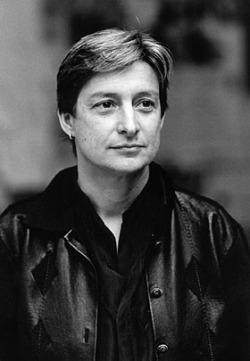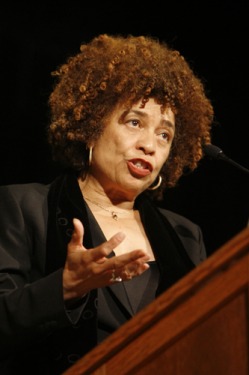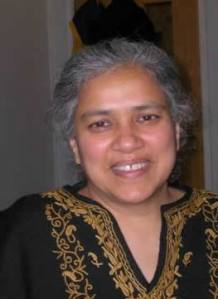 Dr. Judith Butler
Dr. Judith Butler First, here’s Judith:
"When I consider what it means today, to accept such an award [Award for Civil Courage], then I believe, that I would actually lose my courage, if I would simply accept the prize under the present political conditions. ... For instance: Some of the organizers explicitly made racist statements or did not dissociate themselves from them. The host organizations refuse to understand anti-racist politics as an essential part of their work. Having said this, I must distance myself from this complicity with racism, including anti-Muslim racism."
Now, I am not a big fan of Butler’s work. I think gender is about as performative as oppression… and I'm suspicious of any theory founded by pro-pedophilia activists (see my play Hermeneutic Circlejerk)… and I’m always nervous about people who say things like,“The move from a structuralist account in which capital is understood to structure social relations in relatively homologous ways to a view of hegemony in which power relations are subject to repetition, convergence, and rearticulation brought the question of temporality into the thinking of structure, and marked a shift from a form of Althusserian theory that takes structural totalities as theoretical objects to one in which the insights into the contingent possibility of structure inaugurate a renewed conception of hegemony as bound up with the contingent sites and strategies of the rearticulation of power”
… but leaving those concerns alone for the moment, Butler's action in Berlin this week was courageous and spot-on. And the fact she gave the speech in German just puts the cherry on top. (Read the translation or watch the video.)
 Dr. Angela Davis
Dr. Angela Davis “Well, I certainly hope that Judith Butler’s refusal to receive the Civil Courage Award will act as a catalyst for more discussion about the impact of racism, even within groups that are considered to be progressive… Somehow, [the idea that] people from the Global South, people of color are more homophobic than white people—is a racist assumption. When we consider the extent to which the ideological structures of homophobia, of transphobia, of heteropatriarchy are embedded in our institutions, the assumption that one group of people is going to be more homophobic than another group of people misses the mark. It misses the mark because we not only have to address issues of attitudes; we have to address the institutions that perpetuate those attitudes and that inflict real violence on human beings.”
Davis goes on to say, “…when we win victories in movement struggles, what we do is we change the whole terrain of struggle. So we don’t simply add on: we don’t add on women to black people; we don’t add on LGBT people to women and to black people; we don’t add on trans people and so forth. Each time we win a significant victory, it requires us to revisit the whole terrain of struggle. And so therefore, we have to ask questions about the impact of racism in gay and lesbian movements, we have to ask questions about the impact of racism in the women’s movement, we have to ask questions about the impact of sexism or misogyny in black communities, and we have to ask questions about the influence of homophobia in black communities or communities of color.”
The whole terrain. This incident has triggered three memories for me. The first is personal. I was hired to teach a workshop on diversity to a group of young people in an urban gardening project. Most of them were Somalian immigrants. The woman who hired me was in the room, and everything was going well during the racism and sexism segments, but when I got to the LGBT component, and came out as a lesbian, and explained how homophobia constituted a violation of human rights... well, things started to unravel. Confronted with what Allah and the Koran have to say about queers, I explained how such teachings are actually political positions masquerading as sacred writing. The woman who hired me was looking miserable.
This is a population who have had to contend with horrendous racism here in my home state, with their cultural identity in crisis from twin threats of discrimination and assimilation. I understood that the students experienced my statements as direct and probably racist attacks on their cultural identity, and I had to remind myself that it was probable that at least one of the kids in the room was or would be LGBT, and that his or her identity was already under attack.
The second memory was of an international organization for women writers, to which I used to belong. They had a comprehensive diversity policy. I know, because I helped draft it. The policy was inclusive of both religion and sexual orientation. A situation arose, where a press that was church-owned, but hiding that affiliation from the public, was busted for covert discrimination against LGBT writers. The writers' organization chose to privilege the interests of the publisher over those of its lesbian members who were protesting the discrimination. Homophobia, apparently, came under the rubric of religious tolerance.
 Gita Sahgal
Gita Sahgal “I was hired as the Head of the Gender Unit as the organization began to develop its Stop Violence Against Women campaign. I leave with great sadness as the campaign is closed. Thousands of activists of Amnesty International enthusiastically joined the campaign. Many hoped that it would induce respect for women’s human rights in every aspect of the work. Today, there is little ground for optimism.”
Sahgal goes on to talk about AI’s decision to support a former detainee from Guantanamo, who is a proponent of jihad. “Unfortunately, their stance has laid waste every achievement on women’s equality and made a mockery of the universality of rights. In fact, the leadership has effectively rejected a belief in universality as an essential basis for partnership.”
The whole terrain. Thank you, Dr. Davis, and thank you for reminding us, "This notion of intersecting or cross-hatched or overlaying categories of oppression is one that has come to us thanks to the work of women of color feminists."

 RSS Feed
RSS Feed
